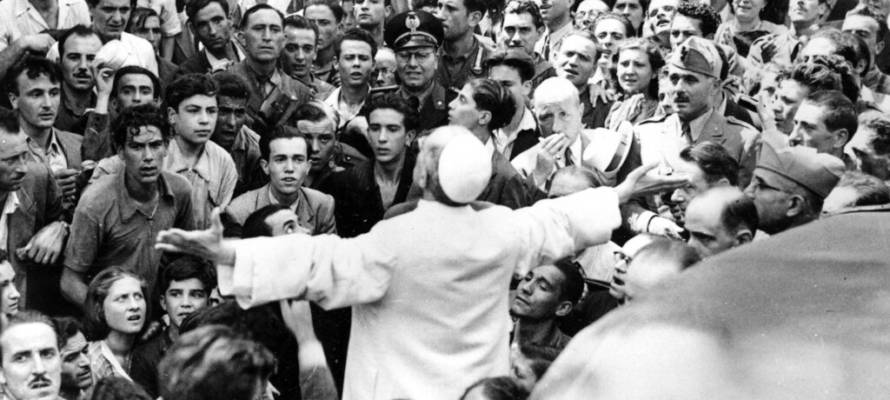“Once we have peace, the Catholics will be more loyal than anyone”: New book reveals wartime Pope’s message to Hitler during secret talks.
By Ben Cohen, The Algemeiner
Pope Pius XII, the head of the Catholic Church during World War II, engaged in secret negotiations with Nazi leader Adolf Hitler through an intermediary, in the hope of reconciling the Church with the Third Reich, a new book has revealed.
The significant new revelations about Pius’ relationship with the Nazi regime contained in “The Pope at War: The Secret History of Pius XII, Mussolini and Hitler,” by the American historian David Kertzer, are based on research in the wartime archives of the Vatican, which were first made available to scholars in March 2020.
Scathingly described by critics as “Hitler’s Pope,” Pius has been condemned by many historians for downplaying, overlooking and even enabling the Nazi genocide of the Jews.
According to Kertzer, Hitler and his lieutenants saw an opening to improve relations with the Vatican following the death in 1939 of the pontiff’s predecessor, Pius XI — who had issued an encyclical condemning Nazi ideology, much to the annoyance of Berlin.
“Hitler now saw a chance to improve relations with the Vatican, or in any case to keep the new pope from openly criticizing his regime,” Kertzer wrote, in an excerpt from the book published by The Atlantic magazine.
As a go-between, Hitler turned to Prince Philipp von Hessen, a German aristocrat and a great-grandson of Queen Victoria. An enthusiastic Nazi, the prince held his first meeting at The Vatican with Pope Pius on May 11, 1939 — four months before the Nazis sparked the war with the invasion of Poland.
At that first encounter, wrote Kertzer, Pius told Hitler’s envoy “that he was eager to reach an agreement with Hitler and was ready to compromise insofar as his conscience allowed, ‘but for that to happen, there must before anything else be a truce … I am certain that if peace between Church and state is restored, everyone will be pleased. The German people are united in their love for the Fatherland.’”
Pius then claimed: “Once we have peace, the Catholics will be loyal, more than anyone else.”
SS vs the Church
Mindful of Hitler’s concern that word of the negotiations should not be made public until a formal agreement had been reached, Pius also reassured von Hessen that he could be trusted to keep a secret. At a second meeting that August, Pius told von Hessen that he wanted to reach an “honorable agreement” with the Nazi regime, promising that clergy in Germany would not involve themselves in politics.
“In his conversations with von Hessen, the pope never raised any concerns about the Nazis’ anti-Jewish campaign,” Kertzer wrote.
Their next meeting took place in October 1939, more than a month after Nazi forces invaded Poland. Anxious about the Nazi regime’s policy towards the Catholic Church, Pius “decided to bring up an argument he thought might appeal to Hitler,” wrote Kertzer.
“Germany’s enemies were making ample use of the Reich’s poor treatment of the churches … If Hitler were to give a signal and the situation were to improve, it would pave the way for productive negotiations,” the passage continued.
“‘I understand other tasks require the Führer’s energy right now,’ the pope said. “But such a signal, such a Stop!, is possible and most important. That is because, and there is no doubt about it, the persecutions go on. Deliberately and systematically.’”
Pius later gave von Hessen a list of demands for Hitler regarding the position of Catholics in Germany. “For example, one cannot advance in the SS without having discarded one’s membership in the Church,” read one of the pope’s complaints.
No Criticism Hitler’s Genocidal Mayhem
In March 1940, the pope received the Nazi Foreign Minister, Joachim von Ribbentrop, at The Vatican. Accounts of the meeting relate that Ribbentrop behaved boorishly — declining to kneel before the pontiff, as was the custom, and telling him that the main reason the Church had survived was that the Nazis were effectively containing the spread of communism.
At the same time, he emphasized that Hitler had “quashed no fewer than 7,000 indictments of Catholic clergymen, charged with a variety of financial and sexual crimes, and was continuing the National Socialist government’s policy of giving a large annual financial subsidy to the Catholic Church,” wrote Kertzer. For good measure, von Ribbentrop added that he was convinced of a German victory in the war by the year’s end.
“Pius XII and Adolf Hitler had no affection for each other,” Kertzer observed. “Yet each man had his own reasons for initiating these talks. The pope placed the highest priority on reaching a deal with the Nazi regime to end the persecution of the Roman Catholic Church in the Third Reich and in the lands that it conquered. For his part, Hitler saw an opportunity to end the papal criticism that had become such an irritant under the previous pope.”
Hitler’s concerns that The Vatican would criticize his antisemitic persecution was apparently unwarranted. “There is no indication that the pope ever brought up the Nazis’ campaign against Europe’s Jews as an issue,” Kertzer wrote. As for the Nazi leader’s worry that Catholic clergy would intervene in politics, Pius assured him that this would not be the case.
“As the war years wore on, in all their horror, Pius XII came under great pressure to denounce Hitler’s regime and its ongoing attempt to exterminate Europe’s Jews,” Kertzer continued. “He would resist until the end.”
The degree to which Pius assisted and advocated for Jews facing the Nazi genocide has been furiously debated among historians for decades. Some accounts of the period have portrayed Pius as a confirmed antisemite who colluded with Hitler’s regime, while others have asserted that thousands of Jews were saved from death by the discreet diplomacy practiced by the pontiff.
